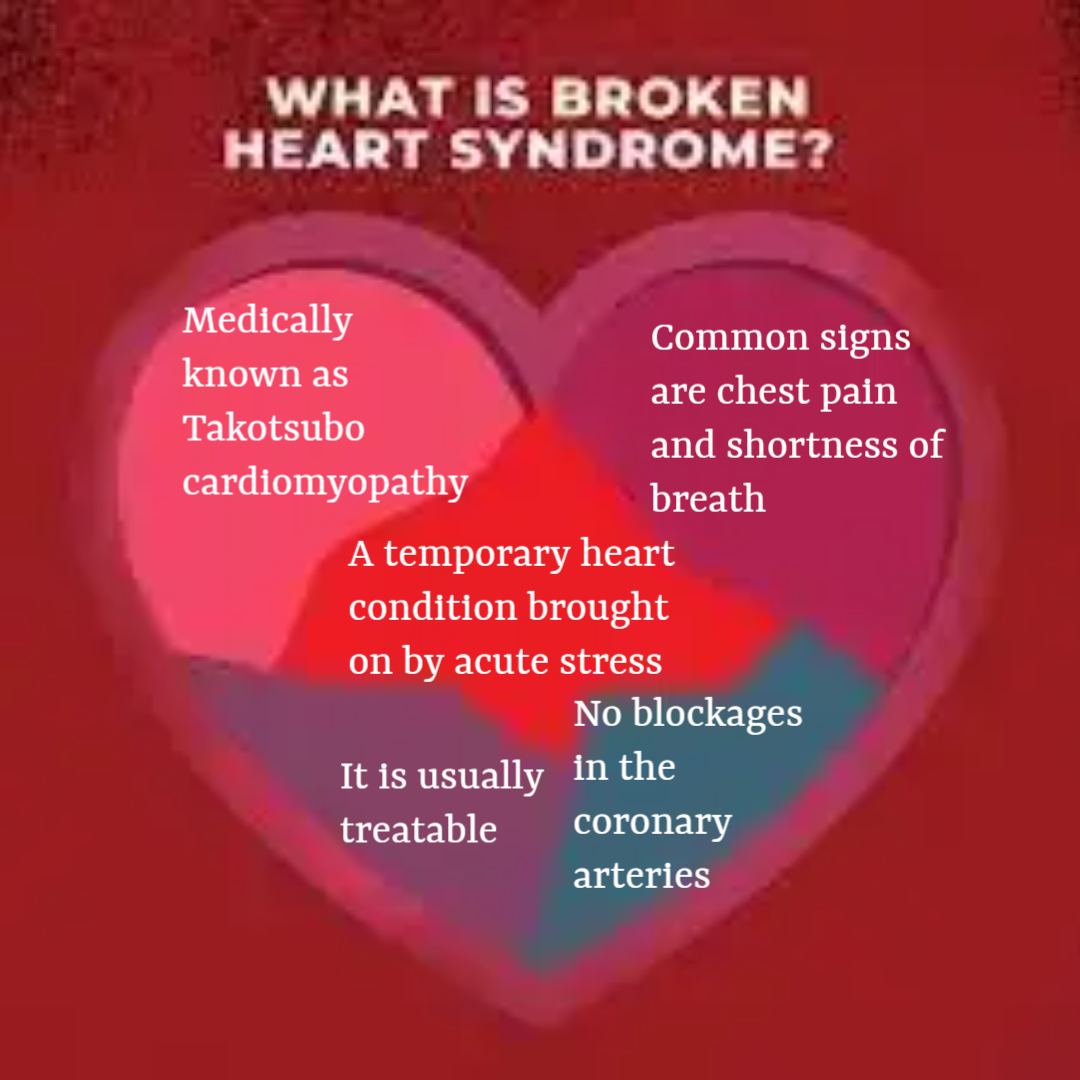- 07736 104738
- sam@medicalmassagelady.com
- Mon - Sat, 8:00 - 18:30
(BROKEN HEART SYNDROME/TAKOTSUBO SYNDROME/APICAL BALLOONING SYNDROME)
We use the expression “broken heart” all the time when there has been an emotional loss, but the stress of losing a loved one can cause cardiovascular issues. Stress induced cardiomyopathy, or broken heart syndrome usually occurs following a particularly stressful event, and is still not fully understood, but it is usually temporary, with symptoms lasting a few days to a few weeks. The symptoms, such as chest pain and difficulty breathing, can mimic a heart attack, but those with broken heart syndrome do not suffer lasting damage to their hearts.
The left ventricle, which pumps the blood can enlarge or change shape, weakening the heart and affecting how effectively it pumps blood. When there has been extremely high levels of stress, adrenaline and other stress hormones can overwhelm the heart, causing the arteries supplying the heart to narrow. This is similar to what happens during a heart attack, when the blood supply to heart muscles is restricted. but is reversible. This also raises the question as to whether those suffering from PTSD are at an increased risk of stress induced cardiomyopathy, due to the circulating adrenaline.
One characteristic of broken heart syndrome which is not present in heart attacks, is the apical ballooning of the left ventricle, which occurs during contraction, causing the middle and the tip of the left ventricle to expand outward.
RISK FACTORS
- Generally affects women over the age of 50
- not genetic like other cardiomyopathies
- a history of neurological conditions, head injuries, or seizure disorders
- those with psychiatric disorders such as anxiety or depression
CAUSES
No definitive cause has been identified, but suggested emotional triggers include:-
- bereavement and grief
- domestic abuse
- physical assault
- financial worries or debt
- extreme anger or fear
- physical stressors eg.
- severe and sudden illness/surgery
- seizure
- significant blood loss
- stroke
- hormonal causes ie. a surge of adrenaline and other stress hormones
- medications – some medications may promote release of stress hormones or contain adrenaline eg. medications for allergic reactions, asthma attacks, some antidepressants and thyroid medications
SYMPTOMS
- weakening of the left ventricle and inefficient pumping of blood
- sudden, intense pain in the chest, usually a feeling of pressure or squeezing
- difficulty breathing/shortness of breath
- irregular heartbeats (atrial fibrillation)
- palpitations
- pain in one or both arms, stomach, jaw, neck or back
- sweating
- dizziness
- feeling/being sick
- loss of consciousness
- death

TREATMENT
Resolving the emotional event that triggered the cardiomyopathy is the most important thing, and learning to manage their stress to prevent the issue from worsening or recurring.
COMPLICATIONS
- lethargy
- hypersomnia
- appetite loss
- anxiety
- insomnia
- irritability
- binge eating
In rare cases, the weakened heart muscle and adrenaline surge may cause:
- heart rhythm abnormalities
- congestive heart failure
- pulmonary oedema
- cardiogenic shock
- low blood pressure
- withdrawal
HOW CAN MASSAGE HELP?
- Reduces stress by inhibiting release of stress hormones such as adrenaline
- Release of emotional and physical tension, and unresolved trauma which may contribute to higher circulating adrenaline levels
- Promote secretion of endorphins, reducing depression
- Work on accessory respiratory muscles, enabling more efficient breathing and oxygenating the tissues
- Improve general circulation
- Help rebalance the nervous system following trauma or in the case of neurological issues which may increase the risk




